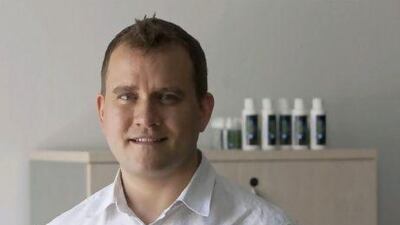Stuart Walsh is the director of Elete Water, a natural hydration product he hopes to see on every construction site across the Middle East. As well as being the region's distributor for the electrolyte, Walsh is the founder of a recruitment consultancy called Budge specialising in the construction and engineering industries.
How would you describe your financial journey so far?
It's been pretty secure; I've always had a job. My parents were pretty conventional in the sense that they got married, bought a house, had kids and set up their own business. They taught me to save for the future so I worked hard from an early age. I had paper rounds and worked in a supermarket during my teens and then moved into marketing and advertising in London before relocating to the UAE in 1998 to manage a hospitality chain's loyalty programme.
Why did you set up your business?
I was always frustrated working for a company because I knew there was more to making money. So when my wife moved to the UAE in 2002 and could not get a job in her field, we decided to set up a recruitment business in 2003. At the peak, we had 20 staff and a general manager running the company, which allowed us to return home to the UK to set up and manage the company's UK operation.
What is the biggest financial challenge you've faced?
The recession. At the beginning of 2009 the recruitment market collapsed. Suddenly we were managing an awful lot of overhead on a minimum income and because I haven't been through a recession before, it was the first time I've had to deal with something like that. It became a case of scaling back and we lost all of our staff, which was pretty upsetting. They say you should try and keep your emotions separate in business but when it's something you've built up over a number of years - it's hard. I moved back out here on my own in 2009 to salvage what we could with the recruitment business and then launched Elete Water in April last year.
How did you go from recruitment to selling an electrolyte product?
My father-in-law is the UK and European distributor for the product and he promotes it to the sports industry. But it's a totally different climate here so we are selling it to the construction industry for their workers.
With recruitment, your people are your commodity; you are selling people to people and require a lot of staff to manage that. As Budge grew, money wasn't the issue - it was dealing with the emotional side of the workforce. Elete, on the other hand, is beautiful because it's a container that arrives at the port and you simply send it to your customer.
What is the most valuable financial lesson you're learnt?
Again it was the recession. I think we were too nice. We didn't have a background in recruitment and could have been a bit more ruthless from the onset. And having a general manager who was not an equity partner does not work very successfully because at the end of the day it's not their business.
Are you a spender or a saver?
I was a spender but now I'm a saver. I think that's another big lesson learnt; we were crazy to think it was going to go on and on. We liked Dubai for the shopping and being able to spend on nice things for the home, holidays and clothes. And we've got a four-bedroom detached house in the UK that we stretched ourselves to buy in 2008 and had to spend money on to furnish. In retrospect, we should have saved a lot more.
Do you plan for the future?
We want to get Budge up and running again but the focus at the moment is on Elete Water. We have the distribution rights across the Middle East and I'm pretty optimistic about the future. At 37, I think I'm still young enough to make it big and I'm certainly young enough to recover from the crisis. But this time around it's like starting from the beginning again but with a lot more responsibility. When we started Budge we didn't have kids or a house but now we have a house in the UK, three kids, aged five, three and three months, and we rent an apartment here. The kids are going to cost more as they get older so that's a pretty daunting task when you want to put them through private school and university and set them on a firm platform on which to build their own life.
What financial advice will you pass onto your children?
To be entrepreneurial. We have village markets so we're talking about renting a stand there and making smoothies and showing them how to invest their pocket money in a blender so that they can make smoothies to sell. The entrepreneurial gene is definitely in the family; my wife's father has his own business; my parents had their own business and it was always a case of stand up and get on with it because no one is going to do it for you.


